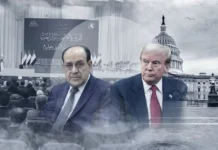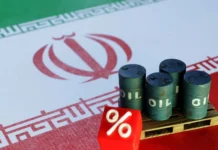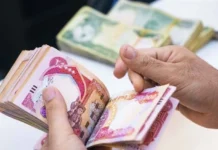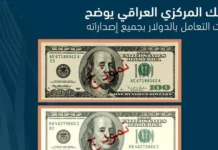Tishwash: Document stating no taxes on Dinar and the report for Vietnam
This is the summary from section 6
FOREIGN EXCHANGE AND REMITTANCES
Foreign Exchange
The currency of Iraq is the dinar (IQD). The Central Bank of Iraq devalued the IQD, by 22.7 percent at the end of Dec 2020, to avoid a liquidity crisis. This came as part of the reform plan put in place by the Prime Minister after the country was simultaneously impacted by COVID -19 and the significant drop in oil prices at that time.
Iraqi authorities confirm that in practice, there are no restrictions on current and capital transactions involving currency exchange if valid documentation supports underlying transactions.
The Investment Law allows investors to repatriate capital brought into Iraq, along with proceeds. Funds can be associated with any form of investment and freely converted into any world currency. The Investment Law also allows investors to maintain accounts at banks licensed to operate in Iraq and transfer capital inside or outside of the country.
The GOI’s monetary policy since 2003 has focused on ensuring price stability primarily by maintaining a de facto peg between the IQD and the U.S. dollar, while seeking exchange rate predictability by supplying U.S. dollars to the Iraqi market. In December 2020, the GOI announced that it would officially devalue the dinar’s peg to the U.S. dollar by 22 percent. Banks may engage in spot transactions in any currency; however, they are not allowed to engage in forward transactions in Iraqi dinars for speculative purposes. There are no taxes or subsidies on purchases or sales of foreign exchange.
the whole report is here https://www.state.gov/reports/2022-investment-climate-statements/iraq/
Here is the link for the same report but for Vietnam
I HAVE NOT READ IT AND I DON’T INTEND to
https://www.state.gov/reports/2023-investment-climate-statements/vietnam
************
BabysMom: Vietnam Tax Document
Vietnam
2. Bilateral Investment Agreements and Taxation Treaties
Vietnam maintains trade relations with 200 countries, and has 65 bilateral investment treaties (BITs) and 26 treaties with investment provisions. It is a party to five free trade agreements (FTAs) with ASEAN, Chile, the Eurasian Customs Union, Japan, and South Korea. As a member of ASEAN, Vietnam also is party to ASEAN FTAs with Australia, New Zealand, China, India, Japan, South Korea, and Hong Kong.
Vietnam finalized an FTA with the European Union in 2015, but the agreement has neither been signed nor ratified. In addition, Vietnam is a member of the Comprehensive and Progressive Agreement for the Trans-Pacific Partnership (CPTPP), which was signed on March 8, 2018. Vietnam is a participant in the Regional Comprehensive Economic Partnership (RCEP) negotiations, which include the 10 ASEAN countries and Australia, China, India, Japan, South Korea, and New Zealand, and it is negotiating FTAs with other countries, including Israel.
A full list of signed agreements to which Vietnam is a party is on the UNCTAD website: http://investmentpolicyhub.unctad.org/IIA/CountryBits/229#iiaInnerMenu .
Vietnam has signed double taxation avoidance agreements with 77 countries, listed at http://taxsummaries.pwc.com/ID/Vietnam-Individual-Foreign-tax-relief-and-tax-treaties . The United States and Vietnam concluded and signed a Double Taxation Avoidance Agreement (DTA) in 2016, but the agreement is still awaiting ratification by the U.S. Congress.
There are no systematic tax disputes between the government and foreign investors. However, an increasing number of U.S. companies disputed tax audits resulting in retroactive tax assessments. These cases may stem from Vietnam’s chronic budget deficits and the need to find sources to fill the revenue gap left from falling tariffs and falling oil revenues. These retroactive tax cases against U.S. companies can obscure the true risks of operating in Vietnam and give some U.S. investors pause when deciding whether to expand operations.
In February 2017, the government released Decree 20/2017/ND-CP, effective since May 2017, which introduced many new transfer-pricing reporting and documentation requirements, as well as new guidance on the tax deductibility of service and interest expenses.
6. Financial Sector
Capital Markets and Portfolio Investment
Although Vietnam welcomes foreign portfolio investment, Morgan Stanley Capital International (MSCI) still classifies Vietnam as a Frontier Market, which precludes some of the world’s biggest asset managers from investing in its stock markets. Vietnam is working to meet the criteria necessary to attain “emerging market” status and attract greater foreign capital inflows.
While the government has acknowledged the need to strengthen both the capital and debt markets, there has been no substantial progress, leaving the banking sector as the primary capital source for Vietnamese companies. Challenges to raising capital domestically include insufficient transparency in Vietnam’s financial markets and non-compliance with internationally accepted accounting standards.
Vietnam has two stock exchanges, which are the HCMC Stock Exchange (HOSE) and the Hanoi Stock Exchange (HNX). The State Securities Commission (SSC) regulates both. As of February 2018, HOSE and HNX had total market capitalization of approximately USD 220 billion, surpassing 110 percent of Vietnam’s GDP. Government bonds account for one fifth of the total market capitalization traded on the HNX. A trading floor for unlisted public companies (UPCOM) operates at the Hanoi Securities Center, where many equitized SOEs first list their shares (due to lower transparency requirements) before moving to HOSE or HNX. Roughly 90 percent of the combined market capitalization is in HOSE.
Vietnam complies with International Monetary Fund (IMF) Article VIII. The government notified the IMF that it accepted the obligations of Article VIII, Sections 2, 3, and 4, effective November 8, 2005.
Banks charge relatively high interest rates for new loans because they must continue to service existing non-performing loans (NPLs). Domestic companies, especially small and medium enterprises (SMEs), often have difficulty accessing credit. Foreign investors are generally able to obtain local financing.
Money and Banking System
The State Bank of Vietnam (SBV) estimates that around 70-80 percent of the total population are underbanked or do not have bank accounts, due to an inherent distrust of the banking sector, the engrained habit of holding assets in cash, foreign currency, and gold, and the limited use of financial technology tools. Since recovering from the 2008 global downturn, Vietnam’s banking sector has been stable. However, despite various banking reforms, Vietnam’s banking sector continues to be concentrated at the top and fragmented at the bottom.
By the end of 2017, state-owned or majority state-owned banks accounted for over 46 percent of total assets, and over 40 percent of equity capital in the banking sector. The estimated total assets in the banking system is USD 454.6 billion. In addition, 31 private joint-stock commercial (private) banks, all smaller than the state-owned banks, are gradually gaining market share. There were also nine foreign-owned banks (HSBC, Standards Chartered, Shinhan, Hong Leong, Woori Bank, Public Bank, CIMB Bank, ANZ and United Overseas Bank), 49 branches of foreign banks, 47 representatives of foreign banks, and two joint-venture banks (Vietnam-Russia Bank and Indovina Bank).
Vietnam has made some progress on reducing its NPLs, but most domestic banks remain under-capitalized with high NPL levels that continue to drag on economic growth. Accurate NPL data is not available and the central bank frequently underreports the level of NPLs. Other issues in the banking sector include state-directed lending by state-owned commercial banks, cross-ownership, related-party lending under non-commercial criteria, and preferential loans to SOEs that crowd out credit to SMEs. By law, banks must maintain a minimum chartered capital of VND 3 trillion (roughly USD 134 million).
Currently, the ceiling for total foreign ownership in a Vietnamese bank remains at 30 percent, with a 5 percent limit for non-strategic individual investors, a 15 percent limit for non-strategic institutional investors, and a 20 percent limit for strategic institutional partners. In early 2017, the Prime Minister promised to increase the limits of foreign ownership in local banks, though he did not specify the new ceiling. Prudential measures and regulations apply the same to domestic and foreign banks.
We are unaware of any lost correspondent-banking relationships in the past three years. However, after the SBV took over three failing banks (Ocean Bank, Construction Bank, and Global Petro Commercial Bank (GP Bank)), and placed Dong A Bank under special supervision in 2015, correspondent-banking relationships with those banks may have been limited.
Vietnam has begun studying blockchain technologies in financial services and SBV established a steering committee on financial technology (fintech) in March 2017.
Foreign Exchange and Remittances
Foreign Exchange Policies
There are no restrictions on foreign investors converting and repatriating earnings or investment capital from Vietnam. However, funds associated with any form of investment cannot be freely converted into any world currency.
The SBV has a mechanism to determine the interbank reference exchange rate. In order to provide flexibility in responding to exchange rate volatility, the SBV now announces the interbank reference exchange rate daily. The rate is determined based on the previous day’s average interbank exchange rates, taking into account movements in the currencies of Vietnam’s major trading and investment partners.
Remittance Policies
Vietnam allows foreign businesses to remit profits, capital contributions, and other legal investment activity revenues in hard currency. There are no time constraints on remittances or limitations on outflow remittances of profits or revenue. However, outward foreign currency transactions require certain supporting documents (such as audited financial statements, import/foreign-service procurement contracts and proof of tax obligation fulfillment, and approval of the SBV on loan contracts etc.).
Sovereign Wealth Funds
The State Capital Investment Corporation (SCIC) technically qualifies as a sovereign wealth fund (SWF), as its mandate is to invest dividends and proceeds from privatization in assets outside of the state-owned sector. It was estimated at USD 2.8 billion in June 2016 (an updated estimate is not available.) However, the SCIC does not manage or invest balance-of-payment surpluses, official foreign currency operations, government transfer payments, fiscal surpluses, or surpluses from resource exports. SCIC’s primary mandate is to manage the non-privatized portion of SOEs. By July 2017, the SCIC managed a portfolio of 141 equitized SOEs, including 134 joint-stock companies, and three limited companies in various sectors. The SCIC invests 100 percent of its portfolio in Vietnam, and the SCIC’s investment of dividends and divestment proceeds does not appear to have any ramifications for U.S. investors. The SCIC budget is reasonably transparent, audited, and can be found at http://www.scic.vn/ .
In addition, the SCIC is working toward membership in the IMF-hosted International Working Group on SWFs.
************
Tishwash: A parliamentary committee reveals the reasons for obstructing the legislation of the oil and gas law
Today, Saturday, member of the Oil, Gas and Natural Resources Committee, Kazem Al-Touki, revealed the reasons for obstructing the legislation of the oil and gas law, while stressing the difficulty of legislating the law.
Al-Touki told Al-Maalouma Agency, “The differences have negatively affected the legislation of the oil and gas law, which faces many political and technical obstacles.”
He added, “Legislating the oil and gas law is not an easy matter, especially after the decisions of the Federal Supreme Court to stop the region’s export of oil through the Turkish Ceyhan port.”
He pointed out that “the legislation of the oil and gas law needs more dialogue and negotiation between Baghdad and Erbil, especially since the legislation of this law was part of the political agreement prior to the formation of the government. link






